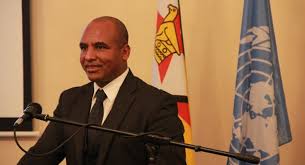By Byron Mutingwende
Sirak Gebrehiwot, a Communications Specialist with the United Nations Resident Coordinator’s Office has said that the local media continues to continues to play critical role in advancing democracy, public discourse on political, economic and social issues despite a plethora of challenges they grapple with in their work.
Sirak made the remarks during a media symposium to commemorate the World Press Freedom Day (WPFD) on 3 May 2017 that was held under the theme, “Critical Minds for Critical Times: Media’s role in advancing a peaceful, just and inclusive Zimbabwe”.
“In Zimbabwe, despite many challenges including economic strains, I am happy to report the media continues to play critical role in advancing democracy, public discourse on political, economic and social issues,” Gebrehiwot said.
Every year on the 3rd of May the world marks World Press Freedom Day, in celebration of the media and the role it plays in fostering democracy, and creating a free and just society.
World Press Freedom Day not only celebrates the fundamental principles of press freedom, but also evaluates press freedom around the world and commits to defend the media from attacks.
“Here today, at this befitting Harare Polytechnic grounds, we are witnessing the convergence of representatives of Government, Media Groups, Associations and journalists and students of journalism and media studies to celebrate and at the same time evaluate press freedom in Zimbabwe and commit to defend media freedom.”
Gebrehiwot paid tribute to UN Secretary General, Antonio Guterres’ calls to defend a free media in the midst of a situation whereby journalists go to the most dangerous places to produce news and often suffer character assassination, sexual assault, injuries and even death.
“As UN, we bear witness to the great role the media is playing in promoting the Agenda 2030 for Sustainable Development and its 17 Goals which, chief among other, aim to end poverty, hunger and achieve equity, peace and justices including environmental justice. As UN we bear witness with gratitude to pro-activeness of the media on reporting humanitarian crisis caused by El Nino induced drought over the past two years and the recent flooding caused by Cyclone Dineo. This has contributed to strengthen the response led by the Government, and supported by UN and partners to those affected by the natural disasters.”
The Deputy Minister of Information, Media and Broadcasting Services, Thokozile Matutu, speaking on behalf of her Minister, Christopher Mushowe, highlighted the need to avoid media polarization.
“Media polarisation is unhealthy, counter-productive, unprofessional and extremely deplorable”, she said.
“It does not benefit our nation but shortchanges our people by serving them a daily diet of half-baked news and misleading information,” she added.
Matutu reiterated the watchdog role of the media and urged them to stick to the ideals of journalism so as to promote meaningful development in Zimbabwe by guarding jealously their profession against abuse by “those burnt on destabilising our societies”.
Delivering the United Nations Educational, Scientific and Cultural Organisation (UNESCO) Director General’s Irina Bokova’s Message on behalf of the UNESCO Regional Office for Southern Africa, Director and Representative, Prof. Hubert Gizjen, the Office’s Regional Culture Advisor, Damir Dijakovic reinforced the critical role of the media in taking forward the 2030 Agenda for Sustainable Development, specifically Sustainable Development Goal 16, on building just, peaceful and inclusive societies.
“The media must not only be a source of reliable information – it should provide a platform for a multitude of voices and mobilize new forces for tolerance and dialogue,” he said.
He said, globally, UNESCO was leading the work towards standing up for the safety of journalists as murder remained the most tragic form of censorship experienced worldwide.
Speaking at the same event, Zimbabwe National Commission for UNESCO Secretary General, Margaret Chirapa highlighted the importance of the global theme.
“The World Press Freedom Day theme for 2017 ‘critical minds for critical times’ is befiting as the media has a critical role to play in the attainment of the Sustainable Development Goals agenda,” she said.
She also reminded journalism students who were present on their role to carry the torch of journalism as they are the future of the profession.
Media organisations and institutions gave solidarity messages emphasizing the current concerns for the media in Zimbabwe. Key concerns raised were political factors affecting media reporting, the need to align media laws with the new Constitution and challenges towards media sustainability. It was highlighted that digitalisation of the media is critical for the Zimbabwean media to align with new technologies.
Other critical issues raised focused on fake news as a deterrent to the media upholding ethical standards. Issues around digital security were deliberated on and media practitioners were urged to be aware of security risks both online and offline.
The media symposium was a multi-stakeholder event that was attended by various media organisations and institutions including Zimbabwe Union of Journalists (ZUJ), Zimbabwe National Editors Forum (ZINEF), Media Alliance of Zimbabwe (MAZ), University of Zimbabwe, Harare Polytechnic and other media stakeholders. Members of the diplomatic community attended the symposium including representatives from the embassies of South Africa, Iran and Indonesia among others.
